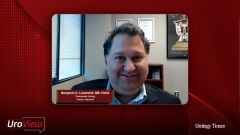
Novel dual agents for advanced prostate cancer
A recap of presentations from AUA 2021 highlighting next steps using novel therapies as combination approaches to treat advanced prostate cancer.
Episodes in this series

Benjamin H. Lowentritt, MD, FACS: You mentioned some of this before, but the other trial that was a interesting was the ODENZA trial, which is the beginning of a comparison between darolutamide and enzalutamide. Is there anything that you found interesting in what we know, or anything you can share?
Julie N. Graff, MD: The one we have at OHSU [Oregon Health & Science University] is called DaroACT. We need to wait for the data. I wouldn’t be surprised if we see that darolutamide is better tolerated, but sometimes we get surprised.
Benjamin H. Lowentritt, MD, FACS: The outcome of that study was that it wasn’t a statistically significant difference in patient preference, with some slight signals one way. But the bottom line is that we have these great drugs. We have a lot of options. We’re at a great time where we need to be aware of all these things and offering them to the patient. You don’t need to just pick 1 and go with it. You have multiple options. The best experience after a time is your own and what you feel comfortable with. We didn’t get a chance to even talk about 1 of the big hurdles, which is financial toxicity and getting stuff approved, because that unfortunately sometimes drives a choice between them. But when we have multiple good options, at least you can feel confident about what you’re using.
Julie N. Graff, MD: Yes.
Benjamin H. Lowentritt, MD, FACS: Is there anything else that came out of either the AUA [American Urological Association 2021 Annual Meeting] or 2021 ASCO [American Society of Clinical Oncology Annual Meeting] this summer that you want to talk about? You mentioned some exciting trials about some new agents. Is there anything else on the horizon that we should know about?
Julie N. Graff, MD: You may not know that I got to do the study that showed that pembrolizumab, which is a checkpoint inhibitor, can lead to profound responses in mCRPC [metastatic castration-resistant prostate cancer] when given with enzalutamide. We’d be remiss not to mention all the immunotherapy studies going on, from primary disease—where people are injecting the tumor and prostate gland directly with immunotherapy—to down the road, where they’re adding a bunch of immunotherapy agents together. I’m interested to see how that pans out. I’m hopeful. For men whose prostate cancer expresses mismatch repair deficiency or is microsatellite instable, checkpoint inhibitors like pembrolizumab can be helpful. But we’re still learning about the other men who seem to respond to it without those features.
Benjamin H. Lowentritt, MD, FACS: That’s really interesting to have more angles to approach this from the get-go. Dr Graff, thank you for joining us today. And to our viewing audience, we hope you found this UroView video series discussion to be rich and informative. Thank you very much for joining us.
Transcript edited for clarity.
Newsletter
Stay current with the latest urology news and practice-changing insights — sign up now for the essential updates every urologist needs.







